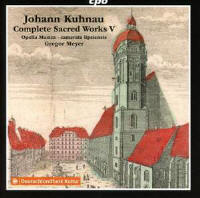Texte paru dans: / Appeared in: |
|
|
Outil de traduction ~ (Très approximatif) |
|
|
Reviewer: James
A. Altena
This is Volume Five in the
ongoing series of recordings by Gregory Meyer, Opella Musica, and camerata
lipsiensis of the complete sacred vocal works of Johann Kuhnau. Honors for
the previous volumes have been evenly split between me (Volumes 1 and 2,
38:5 and 41:6) and colleague Bertil van Boer (Volumes 2 and 4, 40:6 and
42:6). Our verdicts overall have been quite similar: estimable performances
of heretofore underrated repertoire, albeit with certain reservations about
the quality of some of the voices (here, two sopranos and one male alto,
tenor, and bass) in solo passages. They are supported by 10
instrumentalists, not counting conductor/organist Gregor Meyer. In reviewing
Volume 1 my reservations were more pronounced, but I noted improvement in
Volume 3, and I am pleased to say that this upward trajectory continues;
clearly the singers have continued to work on technical issues of vocal
production, and the progress is apparent. If some of the voices are not
absolutely of the first rank, I have no particular complaints any more
either.
Kuhnau’s music continues to
impress me for its quality. The five works presented here are surmised,
uncertainly from stylistic grounds, to be from the earlier part of his
career. Erschrick, mein Herz, vor dir (Tremble, my heart, before thee) is
for bass solo with an SATB close, and Weicht, ihr Sorgen, aus dem Herzen
(Depart, ye cares, from the heart) is for soprano solo, while the other
three cantatas are for mixed vocal forces. (The booklet does not indicate
who sings the latter work; I think that the two sopranos split the duties,
but I cannot be sure.) The overall mood is one of stately gravitas, even in
the most florid passages that reflect the considerable Italian influence on
Kuhnau’s melodic language. The usual expressive effects one expects from
this period are in evidence—for example, in Gott sei mir gnädig, a setting
of a portion of Psalm 51, florid melismas are used for the text “Wash me
thoroughly from my iniquity and cleanse me from my sin” to signify ritual
and spiritual purification with flowing water. Particularly delightful to my
ears is the alto solo “Wie lieblich klingt ihr Sterbe-Glocken” (How sweetly
sound the funeral bells) in Ich habe Lust abzuscheiden (I have a longing to
depart), an unexpectedly lively section with a chattering bassoon underlay
to the vocal line. Kuhnau pulls out all the stops (so to speak) in Singet
dem Herrn ein neues Lied (Sing to the Lord a new song), a celebratory text
whose multiple invocations of musical instruments always induced composers
to provide colorful, effusive settings. Here, two trumpets and timpani get
added to the mix to provide a triumphal, even martial, air. As always, CPO provides top-notch recorded sound, full texts and translations, and elaborate booklet notes, plus artist bios. If you’ve not yet been tempted to try out Kuhnau, here is an excellent place to begin; strongly recommended, and looking forward to the remaining volumes.
| |
|
|
|
|
Cliquez l'un ou l'autre
bouton pour découvrir bien d'autres critiques de CD |
|




